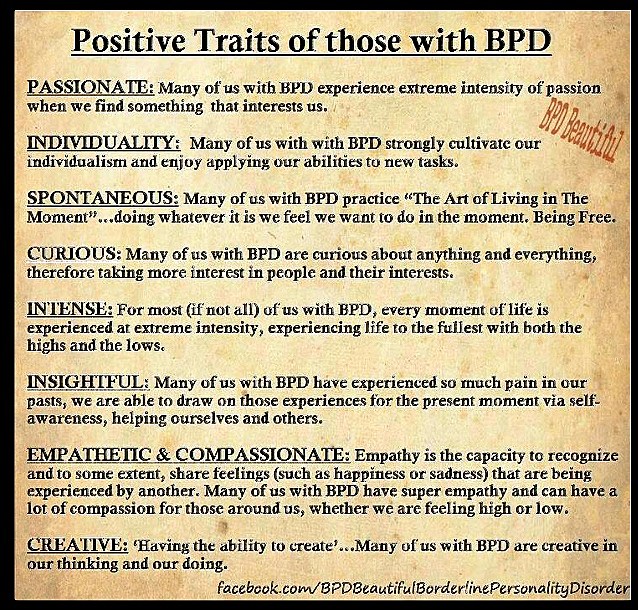I have borderline personality disorder (BPD). AMA, please.
- Thread starter patorick2010
- Start date
You are using an out of date browser. It may not display this or other websites correctly.
You should upgrade or use an alternative browser.
You should upgrade or use an alternative browser.
patorick2010
Mr BPD
patorick2010
Mr BPD
Quite often and in many ways I feel as though I am a terrible human being. Behind every good thing I say or do, lies a bad thought or intention. That is just me, that is my life with borderline personality disorder (BPD).
Life often feels like a daydream of desire and obsession. The desire is mainly to do with objectification, beauty and perfection. Sometimes I cannot stop myself treating women and some parts of them like objects of my selfish desire. Even with that, I am drawn towards people who have strong values, are emotionally intelligent, disciplined and responsible. There are always imperfections, though, and for a fat rugged man I am very superficial. That leads to my obsessions and the never ending need for validation.
The reasons for BPD are many. There are genetic and environmental influences involved. There are events that occur during childhood play a role in the disorder developing. You are not in tune with people’s emotional needs or feelings. This has led to emotional, verbal and physical abuse. Loss, neglect and bullying also contribute. Relationships with partners, friends and family are very difficult and you always feel that people are going to abandon you. We are very impulsive and are very unsure of our identity, which in turn makes me feel more inappropriate, disassociated, irritable and stressed.
I’ve been asked what are the causes of BPD? For me, there is always a feeling of overwhelming anger, fear or distress. There also fears of the consequences of our actions. This can be caused by instability at home, struggling with a personal issue or just stress in general. It can also be because of unjust abuse that you feel that you have copped, neglect that you have felt, or family grief. Knowing the difference between liking, loving and obsession helps to keep it in perspective. The big thing for me is handling what I feel is rejection (from friends, family, pets and people in general). Being nice, living well and not being overly desperate.
There are several treatments for BPD, such as dialectical behaviour therapy (DBT), cognitive behaviour therapy (CBT), mindfulness, meditation, medication, therapy, books, podcasts and support groups (online and in person). Support groups are great, but you have to be your own personal 24/7 support group too. It’s no good trying to be a mental health advocate if I’m not managing my illness, medication, diet, exercise and life in general well. I can’t rely on other people to include me, look after me, cheer me up and make me feel better. That has to come from within. It’s not just about what is going on with me. Mental health is also about my family, my friends, associates and people in the community all together. We all have stories to share, places to be and things to do. Sometimes I get too focused on myself and the things I want to do, rather than family time, work commitments and recreational activities. You need to find a balance so that you can be happier, content, easy going, relax more, be on time, less tired and overwhelmed.
With BPD, it’s so good to be able to talk to people about it, explain what it is and how to manage it. But at the same time not get too overly personal too quickly, leave something to the imagination and not tell out your life story all at once. As interesting and captivating as it maybe.
Please just know that having a mental illness is not a choice. Dealing with it and managing it is a choice. lf my family and me can survive with BPD, you can to. What is stopping you? You are not helpless; you can learn to take care of yourself and your mental illness. It is not up to people to make up for what you did not receive as a child. That is not their job, it’s up to you. You are an adult and you can be ok. Please be honest, mindful, open, truthful and understanding.
Later,
Pat.
[email protected]
Life often feels like a daydream of desire and obsession. The desire is mainly to do with objectification, beauty and perfection. Sometimes I cannot stop myself treating women and some parts of them like objects of my selfish desire. Even with that, I am drawn towards people who have strong values, are emotionally intelligent, disciplined and responsible. There are always imperfections, though, and for a fat rugged man I am very superficial. That leads to my obsessions and the never ending need for validation.
The reasons for BPD are many. There are genetic and environmental influences involved. There are events that occur during childhood play a role in the disorder developing. You are not in tune with people’s emotional needs or feelings. This has led to emotional, verbal and physical abuse. Loss, neglect and bullying also contribute. Relationships with partners, friends and family are very difficult and you always feel that people are going to abandon you. We are very impulsive and are very unsure of our identity, which in turn makes me feel more inappropriate, disassociated, irritable and stressed.
I’ve been asked what are the causes of BPD? For me, there is always a feeling of overwhelming anger, fear or distress. There also fears of the consequences of our actions. This can be caused by instability at home, struggling with a personal issue or just stress in general. It can also be because of unjust abuse that you feel that you have copped, neglect that you have felt, or family grief. Knowing the difference between liking, loving and obsession helps to keep it in perspective. The big thing for me is handling what I feel is rejection (from friends, family, pets and people in general). Being nice, living well and not being overly desperate.
There are several treatments for BPD, such as dialectical behaviour therapy (DBT), cognitive behaviour therapy (CBT), mindfulness, meditation, medication, therapy, books, podcasts and support groups (online and in person). Support groups are great, but you have to be your own personal 24/7 support group too. It’s no good trying to be a mental health advocate if I’m not managing my illness, medication, diet, exercise and life in general well. I can’t rely on other people to include me, look after me, cheer me up and make me feel better. That has to come from within. It’s not just about what is going on with me. Mental health is also about my family, my friends, associates and people in the community all together. We all have stories to share, places to be and things to do. Sometimes I get too focused on myself and the things I want to do, rather than family time, work commitments and recreational activities. You need to find a balance so that you can be happier, content, easy going, relax more, be on time, less tired and overwhelmed.
With BPD, it’s so good to be able to talk to people about it, explain what it is and how to manage it. But at the same time not get too overly personal too quickly, leave something to the imagination and not tell out your life story all at once. As interesting and captivating as it maybe.
Please just know that having a mental illness is not a choice. Dealing with it and managing it is a choice. lf my family and me can survive with BPD, you can to. What is stopping you? You are not helpless; you can learn to take care of yourself and your mental illness. It is not up to people to make up for what you did not receive as a child. That is not their job, it’s up to you. You are an adult and you can be ok. Please be honest, mindful, open, truthful and understanding.
Later,
Pat.
[email protected]
patorick2010
Mr BPD
patorick2010
Mr BPD
patorick2010
Mr BPD
20 Songs That Help People With Borderline Personality Disorder Through Tough Moments
https://themighty.com/2016/12/borderline-personality-songs-bpd/
12/05/16
By Sarah Schuster
Staff
For those with borderline personality disorder who ride a rollar coaster of emotions almost daily, having a good playlist on hand can help bring you back into the moment and take your brain to a place of calm. And while music certainly can’t erase strong emotions – sometimes it can help.
To find out what songs helped people with borderline personality disorder in tough moments, we asked people in our community who live with the disorder to tell us one song that helps them get through.
Here’s what they shared:
1. “Breathe Me” by Sia
“Help, I have done it again / I have been here many times before / Hurt myself again today / And the worst part is there’s no one else to blame.”
2. “On a Good Day” by Above & Beyond
“Little bit lost and / A little bit lonely / Little bit cold here / A little bit feared / But I hold on / And I / Feel strong / And I / Know that I can.”
3. “Drown” by Bring Me the Horizon
“It describes how I used to feel before DBT and now serves as a reminder that only I can save me from myself and only I can stop myself from drowning.” — Niki G.
“It comes in waves, I close my eyes / Hold my breath and let it bury me / I’m not OK, and it’s not alright. /Won’t you drag the lake and bring me home again?”
4. “Skin” by Sixx AM
“I did a cover of ‘Skin’ for my freshman choir karaoke day right after I was diagnosed with borderline. It made me feel less like a freak and more like a human.” Jey S.
“‘Cause they don’t even know you / All they see is scars / They don’t see the angel / Living in your heart / Let them find the real you / Buried deep within / Let them know with all you’ve got / That you are not your skin.”
5. “Asleep” by The Smiths
“Sing me to sleep / Sing me to sleep / And then leave me alone.”
6. “Broken Arrows” by Avicii
“[This song is] especially meaningful to me, as I have scars from my self-harm and I have black and white thinking from BPD, plus I’ve now got an amazing partner who supports and understands me. It’s a great feel good tune to pick me up!” — Merc Y.
“I’ve seen the darkness in the light / The kind of blue that leaves you lost and blind / The only thing that’s black and white / Is that you don’t have to walk alone this time.”
7. “Fight Song” by Rachel Platten
“This song has gotten me through hell and back time and time again. When I was at my lowest point, it brought me back up. It made me take back my life, and prove that I’m alright. It made me fight, made me not give up. Made me strong. I still listen to this song when I need a mental/emotional boost. It still gets me through my toughest days. This song inspired me so much that I ended up getting a piece of the lyrics tattooed on me, along with an anchor. It was my first tattoo, and it’s my most cherished piece of art on my body. Since then, I’ve met Rachel twice and found my very best friend because of her. I owe her the world.” — Olivia C.
“This is my fight song / Take back my life song / Prove I’m alright song / My power’s turned on / Starting right now I’ll be strong / I’ll play my fight song / And I don’t really care if nobody else believes / ‘Cause I’ve still got a lot of fight left in me.”
8. “Sunshine” Matisyahu
“Keep on moving till the first rays of dawn / Keeping it on till the day is done / Morning till the night time blaze is on / All along I keep singing my song.”
9. “Identity Disorder” by Of Mice and Men
“Your heart is a fire / But the cold is comforting / My mouth is a liar / With my silver tongue in cheek / The silence is deafening / My words cut deep / The darkness is blinding / Consuming me.”
10. “Shake it Out” by Florence + the Machine
“Regrets collect like old friends / Here to relive your darkest moments / I can see no way, I can see no way / And all of the ghouls come out to play.”
11. “Gasoline” by Halsey
“And all the people say / You can’t wake up, this is not a dream / You’re part of a machine, you are not a human being / With your face all made up, living on a screen / Low on self-esteem, so you run on gasoline.”
12. “Torrek” by Hildur Gudnadottir
“Soft songs with no lyrics help me out so much. I focus on the melody and it helps my brain slow down the pacing, racing, emotional thoughts.” — Katie J.
13. “Extraordinary Machine” by Fiona Apple
“I certainly haven’t been shopping for any new shoes / And / I certainly haven’t been spreading myself around / I still only travel by foot and by foot, it’s a slow climb / But I’m good at being uncomfortable / so I can’t stop changing all the time.”
14. “Warrior” by Demi Lovato
“Now I’m a warrior / Now I’ve got thicker skin / I’m a warrior / I’m stronger than I’ve ever been / And my armor, is made of steel, you can’t get in / I’m a warrior / And you can never hurt me again.”
15. “Blackbird” by The Beatles
“It’s simple enough that I can sing without music and it always soothes me.” — Katey B.
“Blackbird singing in the dead of night / Take these broken wings and learn to fly / All your life / You were only waiting for this moment to arise.”
16. “Cry Baby” by Melanie Martinez
“‘Cry Baby’ is literally my BPD anthem. It is so relatable to me and makes me feel less alone.” — Aqua K.
“Your heart’s too big for your body / It’s where your feelings hide / They’re pouring out / Where everyone can see.”
17. “Sweet as a Whole” by Sara Bareilles
“But like most creatures down here on the ground / I’m composed of the elements moving around / And I grow and change and I shift and I switch / And it turns out I’m actually kind of a bitch.”
18. “I Wanna Get Better” by Bleachers
“I wanna get better / I didn’t know I was broken ’til I wanted to change / I wanna get better, better, better, better / I wanna get better.”
19. “Talking to Myself” by Watsky
“Watsky has pulled me back above water too many times to count.” — Eri A.
“Do you ever get lost, deep in your thoughts, tripping when you think about the cost of seeing this through / When you tie your stomach into knots that you don’t know how to undo.”
20. “Hurt” by Johnny Cash
“What have I become / My sweetest friend / Everyone I know goes away / In the end.”
https://themighty.com/2016/12/borderline-personality-songs-bpd/
https://themighty.com/2016/12/borderline-personality-songs-bpd/
12/05/16
By Sarah Schuster
Staff
For those with borderline personality disorder who ride a rollar coaster of emotions almost daily, having a good playlist on hand can help bring you back into the moment and take your brain to a place of calm. And while music certainly can’t erase strong emotions – sometimes it can help.
To find out what songs helped people with borderline personality disorder in tough moments, we asked people in our community who live with the disorder to tell us one song that helps them get through.
Here’s what they shared:
1. “Breathe Me” by Sia
“Help, I have done it again / I have been here many times before / Hurt myself again today / And the worst part is there’s no one else to blame.”
2. “On a Good Day” by Above & Beyond
“Little bit lost and / A little bit lonely / Little bit cold here / A little bit feared / But I hold on / And I / Feel strong / And I / Know that I can.”
3. “Drown” by Bring Me the Horizon
“It describes how I used to feel before DBT and now serves as a reminder that only I can save me from myself and only I can stop myself from drowning.” — Niki G.
“It comes in waves, I close my eyes / Hold my breath and let it bury me / I’m not OK, and it’s not alright. /Won’t you drag the lake and bring me home again?”
4. “Skin” by Sixx AM
“I did a cover of ‘Skin’ for my freshman choir karaoke day right after I was diagnosed with borderline. It made me feel less like a freak and more like a human.” Jey S.
“‘Cause they don’t even know you / All they see is scars / They don’t see the angel / Living in your heart / Let them find the real you / Buried deep within / Let them know with all you’ve got / That you are not your skin.”
5. “Asleep” by The Smiths
“Sing me to sleep / Sing me to sleep / And then leave me alone.”
6. “Broken Arrows” by Avicii
“[This song is] especially meaningful to me, as I have scars from my self-harm and I have black and white thinking from BPD, plus I’ve now got an amazing partner who supports and understands me. It’s a great feel good tune to pick me up!” — Merc Y.
“I’ve seen the darkness in the light / The kind of blue that leaves you lost and blind / The only thing that’s black and white / Is that you don’t have to walk alone this time.”
7. “Fight Song” by Rachel Platten
“This song has gotten me through hell and back time and time again. When I was at my lowest point, it brought me back up. It made me take back my life, and prove that I’m alright. It made me fight, made me not give up. Made me strong. I still listen to this song when I need a mental/emotional boost. It still gets me through my toughest days. This song inspired me so much that I ended up getting a piece of the lyrics tattooed on me, along with an anchor. It was my first tattoo, and it’s my most cherished piece of art on my body. Since then, I’ve met Rachel twice and found my very best friend because of her. I owe her the world.” — Olivia C.
“This is my fight song / Take back my life song / Prove I’m alright song / My power’s turned on / Starting right now I’ll be strong / I’ll play my fight song / And I don’t really care if nobody else believes / ‘Cause I’ve still got a lot of fight left in me.”
8. “Sunshine” Matisyahu
“Keep on moving till the first rays of dawn / Keeping it on till the day is done / Morning till the night time blaze is on / All along I keep singing my song.”
9. “Identity Disorder” by Of Mice and Men
“Your heart is a fire / But the cold is comforting / My mouth is a liar / With my silver tongue in cheek / The silence is deafening / My words cut deep / The darkness is blinding / Consuming me.”
10. “Shake it Out” by Florence + the Machine
“Regrets collect like old friends / Here to relive your darkest moments / I can see no way, I can see no way / And all of the ghouls come out to play.”
11. “Gasoline” by Halsey
“And all the people say / You can’t wake up, this is not a dream / You’re part of a machine, you are not a human being / With your face all made up, living on a screen / Low on self-esteem, so you run on gasoline.”
12. “Torrek” by Hildur Gudnadottir
“Soft songs with no lyrics help me out so much. I focus on the melody and it helps my brain slow down the pacing, racing, emotional thoughts.” — Katie J.
13. “Extraordinary Machine” by Fiona Apple
“I certainly haven’t been shopping for any new shoes / And / I certainly haven’t been spreading myself around / I still only travel by foot and by foot, it’s a slow climb / But I’m good at being uncomfortable / so I can’t stop changing all the time.”
14. “Warrior” by Demi Lovato
“Now I’m a warrior / Now I’ve got thicker skin / I’m a warrior / I’m stronger than I’ve ever been / And my armor, is made of steel, you can’t get in / I’m a warrior / And you can never hurt me again.”
15. “Blackbird” by The Beatles
“It’s simple enough that I can sing without music and it always soothes me.” — Katey B.
“Blackbird singing in the dead of night / Take these broken wings and learn to fly / All your life / You were only waiting for this moment to arise.”
16. “Cry Baby” by Melanie Martinez
“‘Cry Baby’ is literally my BPD anthem. It is so relatable to me and makes me feel less alone.” — Aqua K.
“Your heart’s too big for your body / It’s where your feelings hide / They’re pouring out / Where everyone can see.”
17. “Sweet as a Whole” by Sara Bareilles
“But like most creatures down here on the ground / I’m composed of the elements moving around / And I grow and change and I shift and I switch / And it turns out I’m actually kind of a bitch.”
18. “I Wanna Get Better” by Bleachers
“I wanna get better / I didn’t know I was broken ’til I wanted to change / I wanna get better, better, better, better / I wanna get better.”
19. “Talking to Myself” by Watsky
“Watsky has pulled me back above water too many times to count.” — Eri A.
“Do you ever get lost, deep in your thoughts, tripping when you think about the cost of seeing this through / When you tie your stomach into knots that you don’t know how to undo.”
20. “Hurt” by Johnny Cash
“What have I become / My sweetest friend / Everyone I know goes away / In the end.”
https://themighty.com/2016/12/borderline-personality-songs-bpd/
patorick2010
Mr BPD
To Family and Friends Who Misunderstand My BPD
https://themighty.com/2016/12/educa...ly-about-borderline-personality-disorder-bpd/
12/02/16
By Kelly Porter
Hi. Remember me? The thin, clumsy, sometimes athletic, blonde girl who you know? Hi! I’m over here. You probably don’t see me because of the fog. That’s OK. I didn’t see me either for a while.
The fog is an easy place to get lost. You see, the fog is misunderstanding. I don’t judge you for misunderstanding, nor do I judge how you present your misunderstanding. It’s scary when you don’t know something.
Let me tell you a secret. I was terrified when I was diagnosed with borderline personality disorder (BPD). But also? I was relieved to finally have an answer to the insufferable pain I’ve been hiding for years.
Having BPD doesn’t make me any different or less me. In fact, it explains exactly why I am who I am. It explains all those nuances that caused yelling, laughter and tears.
I get overwhelmed. I know most people do. You don’t need to tell me that. The thing is my brain is wired differently. So when I get overwhelmed it’s all I can focus on. The pain becomes so unbearable that the only way I know how to stop it is to lash out or make it stop all together. I’m getting better at controlling it, by the way, in case you were wondering.
Having BPD isn’t easy, but it’s not the end of the world. The hardest part is that people don’t understand it. I know I already forgave you for being lost in the fog, but I want you to find a way out. I’m still me. I’m just a little broken, and once I got out of the fog, I was able to start putting the pieces back together.
Please, be patient with me. When I’m tired, it’s not laziness. I have spent the entire day in my head trying not to lose control over my emotions. It’s exhausting having to triple check my reactions to make sure they’re appropriate. I have had severe depression to the point of hospitalization and that might happen again. Please, don’t tell me to snap out of it or that other people have it worse.
Having BPD is like having every single emotion at once firing off like a beretta in your head. Most of the time, I just want to sleep so I don’t have to feel it all. It’s too much for one person to handle. I know how hard it is to understand something that isn’t spoken about openly or informatively.
My own diagnosis was the first time I heard about BPD, but a little research goes a long way. Dear family and friends, before you judge me, before you think you understand what is going on in my brain, before you unintentionally invalidate me, please, just do a little research. Go to the National Institute of Mental Health and browse BPD or ask me questions about certain things. Did you know I have triggers? Things that set me off into a severe BPD episode? I bet you didn’t because I had no idea either.
Let’s get out of that fog and learn together. Shall we? After all, I’m still me and aren’t we all just a little messy anyways?
https://themighty.com/2016/12/educa...ly-about-borderline-personality-disorder-bpd/
12/02/16
By Kelly Porter
Hi. Remember me? The thin, clumsy, sometimes athletic, blonde girl who you know? Hi! I’m over here. You probably don’t see me because of the fog. That’s OK. I didn’t see me either for a while.
The fog is an easy place to get lost. You see, the fog is misunderstanding. I don’t judge you for misunderstanding, nor do I judge how you present your misunderstanding. It’s scary when you don’t know something.
Let me tell you a secret. I was terrified when I was diagnosed with borderline personality disorder (BPD). But also? I was relieved to finally have an answer to the insufferable pain I’ve been hiding for years.
Having BPD doesn’t make me any different or less me. In fact, it explains exactly why I am who I am. It explains all those nuances that caused yelling, laughter and tears.
I get overwhelmed. I know most people do. You don’t need to tell me that. The thing is my brain is wired differently. So when I get overwhelmed it’s all I can focus on. The pain becomes so unbearable that the only way I know how to stop it is to lash out or make it stop all together. I’m getting better at controlling it, by the way, in case you were wondering.
Having BPD isn’t easy, but it’s not the end of the world. The hardest part is that people don’t understand it. I know I already forgave you for being lost in the fog, but I want you to find a way out. I’m still me. I’m just a little broken, and once I got out of the fog, I was able to start putting the pieces back together.
Please, be patient with me. When I’m tired, it’s not laziness. I have spent the entire day in my head trying not to lose control over my emotions. It’s exhausting having to triple check my reactions to make sure they’re appropriate. I have had severe depression to the point of hospitalization and that might happen again. Please, don’t tell me to snap out of it or that other people have it worse.
Having BPD is like having every single emotion at once firing off like a beretta in your head. Most of the time, I just want to sleep so I don’t have to feel it all. It’s too much for one person to handle. I know how hard it is to understand something that isn’t spoken about openly or informatively.
My own diagnosis was the first time I heard about BPD, but a little research goes a long way. Dear family and friends, before you judge me, before you think you understand what is going on in my brain, before you unintentionally invalidate me, please, just do a little research. Go to the National Institute of Mental Health and browse BPD or ask me questions about certain things. Did you know I have triggers? Things that set me off into a severe BPD episode? I bet you didn’t because I had no idea either.
Let’s get out of that fog and learn together. Shall we? After all, I’m still me and aren’t we all just a little messy anyways?
patorick2010
Mr BPD
Is it possible for someone with BPD to overcome it by themselves with awareness?
https://www.quora.com/Is-it-possibl...D-to-overcome-it-by-themselves-with-awareness
Elinor Greenberg, PhD Psychologist
The short answer is no.
The basic reasons why someone cannot overcome Borderline Personality Disorder on their own are:
- It is hard to be objective about one’s own problems.
- Therapists require years of specialized training to understand and treat BPD. This training is unavailable to people who are not mental health professionals.
- Borderline defenses are designed to keep the underlying painful feelings left over from childhood trauma out-of-awareness. You cannot work on what you are unaware of.
- Borderline individuals use “Splitting” as a defense. This means that they cannot see themselves and others in an integrated and stable way. Instead they alternate between two unrealistic views: either they are all-bad and unlovable or all-good and lovable.
- To heal “Splitting” requires an objective observer (the therapist) who can see the person in an integrated way and who is trained to work with “Splitting.”
- Many of the issues that surface when the person stops defensively acting out to distract themselves from feeling their pain—by cutting, binging, substance abuse, fighting, and so on—need considerable professional expertise to work on successfully without overwhelming the person emotionally.
- Many Borderline individuals have been physically and sexually abused and/or abandoned. They sometimes suffer from PTSD as well. These complex issues are very difficult to deal with, even with the help of a well trained therapist.
- Borderline individuals do not have enough internal support (and the necessary knowledge) to do all of this on their own.
- The therapy for Borderline PD requires a number of years of consistent and focused hard work. Most people with BPD cannot commit to meditating for 10 minutes every day. It is unlikely they will be disciplined enough to do the necessary therapy with themselves even if they understood what it involved.
Punchline: Even psychotherapists go to other psychotherapists to get help with their problems. The psychotherapy of Borderline Personality Disorder is complicated and lengthy and requires specialized training. Trying to do it entirely on one’s own is a bit like trying to do your own knee replacement surgery.
Elinor Greenberg, PhD, CGP
In private practice in NYC and the author of the book: Borderline, Narcissistic, and Schizoid Adaptations: The Pursuit of Love, Admiration, and Safety.
www.elinorgreenberg.com
https://www.quora.com/Is-it-possibl...D-to-overcome-it-by-themselves-with-awareness
Elinor Greenberg, PhD Psychologist
The short answer is no.
The basic reasons why someone cannot overcome Borderline Personality Disorder on their own are:
- It is hard to be objective about one’s own problems.
- Therapists require years of specialized training to understand and treat BPD. This training is unavailable to people who are not mental health professionals.
- Borderline defenses are designed to keep the underlying painful feelings left over from childhood trauma out-of-awareness. You cannot work on what you are unaware of.
- Borderline individuals use “Splitting” as a defense. This means that they cannot see themselves and others in an integrated and stable way. Instead they alternate between two unrealistic views: either they are all-bad and unlovable or all-good and lovable.
- To heal “Splitting” requires an objective observer (the therapist) who can see the person in an integrated way and who is trained to work with “Splitting.”
- Many of the issues that surface when the person stops defensively acting out to distract themselves from feeling their pain—by cutting, binging, substance abuse, fighting, and so on—need considerable professional expertise to work on successfully without overwhelming the person emotionally.
- Many Borderline individuals have been physically and sexually abused and/or abandoned. They sometimes suffer from PTSD as well. These complex issues are very difficult to deal with, even with the help of a well trained therapist.
- Borderline individuals do not have enough internal support (and the necessary knowledge) to do all of this on their own.
- The therapy for Borderline PD requires a number of years of consistent and focused hard work. Most people with BPD cannot commit to meditating for 10 minutes every day. It is unlikely they will be disciplined enough to do the necessary therapy with themselves even if they understood what it involved.
Punchline: Even psychotherapists go to other psychotherapists to get help with their problems. The psychotherapy of Borderline Personality Disorder is complicated and lengthy and requires specialized training. Trying to do it entirely on one’s own is a bit like trying to do your own knee replacement surgery.
Elinor Greenberg, PhD, CGP
In private practice in NYC and the author of the book: Borderline, Narcissistic, and Schizoid Adaptations: The Pursuit of Love, Admiration, and Safety.
www.elinorgreenberg.com
patorick2010
Mr BPD
http://www.dailyadvertiser.com.au/story/4572945/letters-to-the-editor/?cs=150
4 Apr 2017, 9 a.m.
Hope starts with you
QUITE often I feel as though I am a terrible human being.
Behind every good thing I say or do lies a bad thought or intention.
That is just me and my life with borderline personality disorder.
Life often feels like a daydream of desire and obsession.
The desire is mainly to do with objectification, beauty and perfection.
I am drawn towards people who have strong values, are emotionally intelligent, disciplined and responsible.
There are always imperfections, though, and for a fat, rugged man I am very superficial.
That leads to my obsessions and the never-ending need for validation.
Having borderline personality disorder, you are not in tune with people’s emotional needs or feelings.
Relationships with partners, friends and family are very difficult and you always feel that people are going to abandon you.
We are very manipulative, impulsive and are very unsure of our identity, which in turn makes me more feel more inappropriate, disassociated, irritable and stressed.
Support groups, such as Samantha Brunskill’s Embrace Mental Health Meetups (Wagga, 6pm, Romanos, first Thursday of each month) are great.
Prior to going to my first Embrace meeting, I’d hidden from almost everyone for the past 10 years or so, afraid of being rejected and hurt again.
Now though I play indoor soccer every Tuesday night, I exercise at the gym and I do yoga twice a week.
This and other good stuff would not have happened were it not for Samantha, Madeleine and Embrace.
I cannot thank them enough and I owe them a lot.
Life is nowhere near perfect but it’s much better in terms of mental and physical health for me now than it was before.
That said, you still have to be your own personal 24/7 support group too and not take your psychological issues out on other people.
It’s no good trying to be a mental health advocate if I’m not managing my illness, medication, diet, exercise and life in general well in accordance with advice from qualified health experts.
I can’t rely on another person to validate me as that has to come from within.
With mental health in general, it’s so good to be able to talk to people about it, explain what it is, how to manage it and how you are going.
But at the same time not get too overly personal too quickly (not tell out your life story all at once).
Please just know that having a mental illness is not a choice, dealing with it and managing it is.
You are not helpless; you can learn to take care of yourself.
It is not up to people to make everything better for you.
That is not their job, it’s up to you.
You can be OK.
Please be honest, mindful, open, truthful and understanding.
You don't have to feel like or be a victim.
No one is perfect.
Accept imperfections, you will feel much better.
Face it and embrace it.
Patrick Flynn (Me)
Wagga
4 Apr 2017, 9 a.m.
Hope starts with you
QUITE often I feel as though I am a terrible human being.
Behind every good thing I say or do lies a bad thought or intention.
That is just me and my life with borderline personality disorder.
Life often feels like a daydream of desire and obsession.
The desire is mainly to do with objectification, beauty and perfection.
I am drawn towards people who have strong values, are emotionally intelligent, disciplined and responsible.
There are always imperfections, though, and for a fat, rugged man I am very superficial.
That leads to my obsessions and the never-ending need for validation.
Having borderline personality disorder, you are not in tune with people’s emotional needs or feelings.
Relationships with partners, friends and family are very difficult and you always feel that people are going to abandon you.
We are very manipulative, impulsive and are very unsure of our identity, which in turn makes me more feel more inappropriate, disassociated, irritable and stressed.
Support groups, such as Samantha Brunskill’s Embrace Mental Health Meetups (Wagga, 6pm, Romanos, first Thursday of each month) are great.
Prior to going to my first Embrace meeting, I’d hidden from almost everyone for the past 10 years or so, afraid of being rejected and hurt again.
Now though I play indoor soccer every Tuesday night, I exercise at the gym and I do yoga twice a week.
This and other good stuff would not have happened were it not for Samantha, Madeleine and Embrace.
I cannot thank them enough and I owe them a lot.
Life is nowhere near perfect but it’s much better in terms of mental and physical health for me now than it was before.
That said, you still have to be your own personal 24/7 support group too and not take your psychological issues out on other people.
It’s no good trying to be a mental health advocate if I’m not managing my illness, medication, diet, exercise and life in general well in accordance with advice from qualified health experts.
I can’t rely on another person to validate me as that has to come from within.
With mental health in general, it’s so good to be able to talk to people about it, explain what it is, how to manage it and how you are going.
But at the same time not get too overly personal too quickly (not tell out your life story all at once).
Please just know that having a mental illness is not a choice, dealing with it and managing it is.
You are not helpless; you can learn to take care of yourself.
It is not up to people to make everything better for you.
That is not their job, it’s up to you.
You can be OK.
Please be honest, mindful, open, truthful and understanding.
You don't have to feel like or be a victim.
No one is perfect.
Accept imperfections, you will feel much better.
Face it and embrace it.
Patrick Flynn (Me)
Wagga
patorick2010
Mr BPD
patorick2010
Mr BPD
For Samantha.
Sharing a snippet of the Australian Rotary Health Mental Health Research project video I was asked to film a little video for
 keen to hear others views on the importance of mental health research.
keen to hear others views on the importance of mental health research.
https://www.facebook.com/samjbrunskill/?fref=nf
Sharing a snippet of the Australian Rotary Health Mental Health Research project video I was asked to film a little video for
https://www.facebook.com/samjbrunskill/?fref=nf
patorick2010
Mr BPD
http://s3.amazonaws.com/WWD_Episodes/2013/WWD-Tommaso-Ciampa.mp3
Interview w/ Tommaso Ciampa
November 5, 2013
Get in ring w/ Tommaso Ciampa. Join Marty & “The Sicilian Psychopath” on one amazing episode to talk about wrestling, dream jobs & suicide. Let’s podcast.
http://wrestlingwithdepression.com/interview-w-tommaso-ciampa/


Interview w/ Tommaso Ciampa
November 5, 2013
Get in ring w/ Tommaso Ciampa. Join Marty & “The Sicilian Psychopath” on one amazing episode to talk about wrestling, dream jobs & suicide. Let’s podcast.
http://wrestlingwithdepression.com/interview-w-tommaso-ciampa/


patorick2010
Mr BPD
(I got really angry on Thursday. Intensely angry. And I took it out a bit on some innocent people that I care about who didn't deserve it. And then I got really upset and cried. Second time I've cried all year. It was good though, I've been holding some feelings and things in which I need to talk more about, be more mindful of, understand and deal with better.
Later, Pat)
Managing your anger: Control your thinking
When you're angry, your thinking can get exaggerated and irrational. Try replacing these kinds of thoughts with more useful, rational ones and you should find that this has an effect on the way you feel.
For example, instead of telling yourself ‘I can't stand it, it's awful and everything's ruined', tell yourself ‘It's frustrating, and it's understandable that I'm upset about it, but it's not the end of the world and getting angry is not going to fix it'.
Develop a list of things to say to yourself before, during and after situations that may make you angry. It is more helpful if these things focus on how you are managing the situation rather than what other people should be doing. Psychologists call this type of thinking ‘self talk'.
Before:
‘I'll be able to handle this. It could be rough, but I have a plan.'
‘If I feel myself getting angry, I'll know what to do.'
During:
‘Stay calm, relax, and breathe easy.'
‘Stay calm, I'm OK, s/he's not attacking me personally.'
‘I can look and act calm.'
After:
‘I managed that well. I can do this. I'm getting better at this.'
‘I felt angry, but I didn't lose my cool.'
https://www.psychology.org.au/publications/tip_sheets/anger/
Later, Pat)
Managing your anger: Control your thinking
When you're angry, your thinking can get exaggerated and irrational. Try replacing these kinds of thoughts with more useful, rational ones and you should find that this has an effect on the way you feel.
For example, instead of telling yourself ‘I can't stand it, it's awful and everything's ruined', tell yourself ‘It's frustrating, and it's understandable that I'm upset about it, but it's not the end of the world and getting angry is not going to fix it'.
Develop a list of things to say to yourself before, during and after situations that may make you angry. It is more helpful if these things focus on how you are managing the situation rather than what other people should be doing. Psychologists call this type of thinking ‘self talk'.
Before:
‘I'll be able to handle this. It could be rough, but I have a plan.'
‘If I feel myself getting angry, I'll know what to do.'
During:
‘Stay calm, relax, and breathe easy.'
‘Stay calm, I'm OK, s/he's not attacking me personally.'
‘I can look and act calm.'
After:
‘I managed that well. I can do this. I'm getting better at this.'
‘I felt angry, but I didn't lose my cool.'
https://www.psychology.org.au/publications/tip_sheets/anger/
patorick2010
Mr BPD
patorick2010
Mr BPD
patorick2010
Mr BPD
https://beyondtheborderline.org/2017/03/03/02-03-17/
BPD Journal
March 3, 2017
Leigh (beyondtheborderline)
Disclosure never gets easier, no matter how casual I’ve become about it. I know that may sound strange from someone who writes a public blog and is in the middle of writing a soon to be public book. But there is still that dread that someone’s opinion of you is going to change, that somehow they will look at and treat you differently.
Today I disclosed my struggle with mental health in the past to my team at work, they at first didn’t believe me and when I explained how I was 3 year ago they told me they couldn’t imagine me like that. My structured clinical management practitioner said something similar when closing my sessions. When he reads my mental health file and interacts with me it was difficult for him to connect the two. I of course see that, I am immensely proud of my growth and awareness over the past few years. I guess that’s why I am now labelled a ‘high functioning borderline’ but none the less at the back of my mind borderline me is telling me that people see me differently now. I of course most of the time ignore that voice or more often argue with the voice.
I think there is a lot of ugly information about BPD floating about on the internet and more often then not people believe what they read. I have been lucky enough to meet many other amazing borderlines each unique in their presentation and journey.
Each time I interact with a fellow borderline I learn something new, I come to a new realisation about myself. That doesn’t stop me worrying that people are going to think of me differently once they know I have BPD, although technically I don’t suffer from enough of the symptoms to meet the criteria for diagnosis anymore, I almost feel like I am at the end of torturous journey through a refiners fire. I have been incident free for over a year, by that I mean I have not had to make use of intervention services. I think it’s important to reflect on that because when I first got my diagnosis I thought I would never be ‘normal’ again, by which I mean socially typical.
But I have been able to turn some of my symptoms into strengths, which have made me very competent at my job. I have been able to establish myself as a rock within my social circle, friends rely on me for advice and guidance. My diagnosis doesn’t define me to them and I well up at the idea of how accepting my friends are of me, even when sometimes I’m a little bit crazy. But like my oldest friend said to me this week, we wouldn’t want you any other way. Everything that I have gone through has shaped who I am today and I love who I am.
BPD Journal
March 3, 2017
Leigh (beyondtheborderline)
Disclosure never gets easier, no matter how casual I’ve become about it. I know that may sound strange from someone who writes a public blog and is in the middle of writing a soon to be public book. But there is still that dread that someone’s opinion of you is going to change, that somehow they will look at and treat you differently.
Today I disclosed my struggle with mental health in the past to my team at work, they at first didn’t believe me and when I explained how I was 3 year ago they told me they couldn’t imagine me like that. My structured clinical management practitioner said something similar when closing my sessions. When he reads my mental health file and interacts with me it was difficult for him to connect the two. I of course see that, I am immensely proud of my growth and awareness over the past few years. I guess that’s why I am now labelled a ‘high functioning borderline’ but none the less at the back of my mind borderline me is telling me that people see me differently now. I of course most of the time ignore that voice or more often argue with the voice.
I think there is a lot of ugly information about BPD floating about on the internet and more often then not people believe what they read. I have been lucky enough to meet many other amazing borderlines each unique in their presentation and journey.
Each time I interact with a fellow borderline I learn something new, I come to a new realisation about myself. That doesn’t stop me worrying that people are going to think of me differently once they know I have BPD, although technically I don’t suffer from enough of the symptoms to meet the criteria for diagnosis anymore, I almost feel like I am at the end of torturous journey through a refiners fire. I have been incident free for over a year, by that I mean I have not had to make use of intervention services. I think it’s important to reflect on that because when I first got my diagnosis I thought I would never be ‘normal’ again, by which I mean socially typical.
But I have been able to turn some of my symptoms into strengths, which have made me very competent at my job. I have been able to establish myself as a rock within my social circle, friends rely on me for advice and guidance. My diagnosis doesn’t define me to them and I well up at the idea of how accepting my friends are of me, even when sometimes I’m a little bit crazy. But like my oldest friend said to me this week, we wouldn’t want you any other way. Everything that I have gone through has shaped who I am today and I love who I am.
patorick2010
Mr BPD
patorick2010
Mr BPD
https://twitter.com/OzBPD/status/850834464934461440
https://www.facebook.com/AustralianBPDFoundation/
Much thanks to the Australian BPD Foundation for posting links to some of my writing
https://www.facebook.com/AustralianBPDFoundation/
Much thanks to the Australian BPD Foundation for posting links to some of my writing
patorick2010
Mr BPD
Hope in fight against borderline disorder
https://thewest.com.au/opinion/hope-in-fight-against-borderline-disorder-ng-ya-104489
Opinion | Nathan Gibson
Thursday, 2 April 2015 3:48PM
It is almost impossible to write about this important issue in a calm and reflective way. The “issues” of self-harm, chaotic or risky behaviour, and overwhelming emotional instability and distress are often too raw for individuals, families and care services to discuss calmly.
The important themes of adolescent self-harm, youth suicide and emotionally volatile young adults who struggle to engage with services continue to attract public attention and often overwhelm us as a community.
But among these struggles, there is hope. There are established and effective therapies, and the majority of young people with existing or emerging features of borderline personality disorder go on to lead meaningful lives.
Borderline personality disorder is characterised by unstable relationships, volatile emotions and self-esteem, and impulsive behaviour. Feelings of emptiness and abandonment, as well as self-harming, are common. The impact on function can be significant, and the emotional distress severe.
Borderline personality disorder is not the same as bipolar disorder. Less than one in 50 people have borderline personality disorder but more people than this have milder symptoms which are not as intrusive. Tragically, about 10 per cent of people with borderline personality disorder suicide in their lifetime — it’s not a low risk.
Past trauma such as sexual abuse is common in this group, so much so that the term “chronic post-traumatic stress disorder” has been used as an alternative diagnosis.
While all of the features can be challenging, self-harm is one of the most difficult and distressing to understand — although not every person who harms themselves has borderline personality disorder.
There are numerous reasons why a person might harm themselves and I have heard many heartbreaking stories throughout my career. One of the most harrowing involved a young woman who felt so numb, empty and detached that she cut herself just to feel real, to know she was alive.
Self-harm can release “internal painkillers” in the body, which may ease emotional, as well as physical, pain and some people feel no physical pain when they self-harm.
A person may have one, many or no immediately apparent reasons for self-harm, and as such the reasons behind self-harm must be clarified.
Often the reasons for self-harm are too confronting for an individual to discuss — the self-harm itself is a way of expressing the pain. Self-harm is usually not “manipulation” but powerful help-seeking. Sadly, over time it can become a repeated and destructive way to reach out to others.
From a clinician’s perspective, working with an individual with borderline personality disorder can be some of the most challenging and confronting therapy work. But it can be extremely rewarding and also very successful — albeit it does take time.
There is no magic pill for borderline personality disorder. In fact, research shows little evidence for the use of medicines in this illness though associated episodes of other mental illnesses like depression should be treated vigorously.
Many individuals are treated in the private sector but research shows that public mental health services also have an important role in the treatment of this disorder. We need to do better to provide our grassroots clinicians with enhanced mentoring when they are working with people with borderline personality disorder.
WA is active in skills training, and only recently the Child and Adolescent Mental Health Service brought world leaders to Perth to train local staff in a newer strategy for working with young people with personality disorders and their families.
The role of the hospital is another controversial discussion often debated in the media. We frequently hear that there are not enough hospital beds for these individuals. In reality, hospitals are not the main solution, although they are important at certain times for specific circumstances.
My experience, also reflected in research and international guidelines, shows that longer term hospital stays for people with borderline personality disorder are not necessarily helpful and in some cases are associated with a worse longer term risk.
Hospitals tend to take away control from patients — they become dependent on others to direct care. This is not always helpful in personality disorders as inpatients can find it difficult to practise the skills to take control of their own lives. The critical (and often life-saving) part of therapy for an individual with borderline personality disorder is to help them take control of their own life. This happens best in community-based therapy.
There are services to treat borderline personality disorders in WA including access to therapies, as well as intensive follow-up in the community if needed. But we can always do better. We need more clinicians trained in working with borderline personality disorder, and enhanced supervision for them.
Families need support during the long journey, and while the course to recovery can be rocky, the vast majority of people with borderline personality disorder do well.
Dr Nathan Gibson is the WA Chief Psychiatrist
https://thewest.com.au/opinion/hope-in-fight-against-borderline-disorder-ng-ya-104489
Opinion | Nathan Gibson
Thursday, 2 April 2015 3:48PM
It is almost impossible to write about this important issue in a calm and reflective way. The “issues” of self-harm, chaotic or risky behaviour, and overwhelming emotional instability and distress are often too raw for individuals, families and care services to discuss calmly.
The important themes of adolescent self-harm, youth suicide and emotionally volatile young adults who struggle to engage with services continue to attract public attention and often overwhelm us as a community.
But among these struggles, there is hope. There are established and effective therapies, and the majority of young people with existing or emerging features of borderline personality disorder go on to lead meaningful lives.
Borderline personality disorder is characterised by unstable relationships, volatile emotions and self-esteem, and impulsive behaviour. Feelings of emptiness and abandonment, as well as self-harming, are common. The impact on function can be significant, and the emotional distress severe.
Borderline personality disorder is not the same as bipolar disorder. Less than one in 50 people have borderline personality disorder but more people than this have milder symptoms which are not as intrusive. Tragically, about 10 per cent of people with borderline personality disorder suicide in their lifetime — it’s not a low risk.
Past trauma such as sexual abuse is common in this group, so much so that the term “chronic post-traumatic stress disorder” has been used as an alternative diagnosis.
While all of the features can be challenging, self-harm is one of the most difficult and distressing to understand — although not every person who harms themselves has borderline personality disorder.
There are numerous reasons why a person might harm themselves and I have heard many heartbreaking stories throughout my career. One of the most harrowing involved a young woman who felt so numb, empty and detached that she cut herself just to feel real, to know she was alive.
Self-harm can release “internal painkillers” in the body, which may ease emotional, as well as physical, pain and some people feel no physical pain when they self-harm.
A person may have one, many or no immediately apparent reasons for self-harm, and as such the reasons behind self-harm must be clarified.
Often the reasons for self-harm are too confronting for an individual to discuss — the self-harm itself is a way of expressing the pain. Self-harm is usually not “manipulation” but powerful help-seeking. Sadly, over time it can become a repeated and destructive way to reach out to others.
From a clinician’s perspective, working with an individual with borderline personality disorder can be some of the most challenging and confronting therapy work. But it can be extremely rewarding and also very successful — albeit it does take time.
There is no magic pill for borderline personality disorder. In fact, research shows little evidence for the use of medicines in this illness though associated episodes of other mental illnesses like depression should be treated vigorously.
Many individuals are treated in the private sector but research shows that public mental health services also have an important role in the treatment of this disorder. We need to do better to provide our grassroots clinicians with enhanced mentoring when they are working with people with borderline personality disorder.
WA is active in skills training, and only recently the Child and Adolescent Mental Health Service brought world leaders to Perth to train local staff in a newer strategy for working with young people with personality disorders and their families.
The role of the hospital is another controversial discussion often debated in the media. We frequently hear that there are not enough hospital beds for these individuals. In reality, hospitals are not the main solution, although they are important at certain times for specific circumstances.
My experience, also reflected in research and international guidelines, shows that longer term hospital stays for people with borderline personality disorder are not necessarily helpful and in some cases are associated with a worse longer term risk.
Hospitals tend to take away control from patients — they become dependent on others to direct care. This is not always helpful in personality disorders as inpatients can find it difficult to practise the skills to take control of their own lives. The critical (and often life-saving) part of therapy for an individual with borderline personality disorder is to help them take control of their own life. This happens best in community-based therapy.
There are services to treat borderline personality disorders in WA including access to therapies, as well as intensive follow-up in the community if needed. But we can always do better. We need more clinicians trained in working with borderline personality disorder, and enhanced supervision for them.
Families need support during the long journey, and while the course to recovery can be rocky, the vast majority of people with borderline personality disorder do well.
Dr Nathan Gibson is the WA Chief Psychiatrist
patorick2010
Mr BPD
What’s the Difference Between Borderline Personality Disorder and Bipolar Disorder?
http://www.optimumperformanceinstitute.com/bpd-program/difference-between-bpd-and-bipolar-disorder/
Borderline personality disorder (BPD) is commonly confused with bipolar disorder. Although they do share some similarities, they are very different disorders. BPD is considered an Axis II diagnosis as a personality disorder while bipolar disorder is considered a clinical syndrome, therefore classifying it as Axis I.
The confusion may also partly be due to the fact that these disorders can exist in the same person simultaneously which is called a comorbid condition. Bipolar disorder and borderline personality disorder are comorbid somewhere between 15 and 20 percent of the time, according to Current Psychiatry.
Mood Swing Variations.
Both disorders are characterized by intense mood swings and mood instability; however, the cycles are different. A person suffering from bipolar disorder swings from intense highs (mania) to extreme lows (depression) usually in a cycle. These cycles of mania and depression can differ from person to person in frequency but can last days, weeks or even years. A person may have periods of mania often followed by a crash into depression.
Someone suffering from BPD may also have mood swings, but they are usually not as sustained or concrete as those of bipolar disorder. The highs and lows of BPD may swing between desperation, anxiety and anger. These cycles are largely dependent on the world around them and can be triggered by a fear of abandonment. The cycles are usually more frequent than those associated with bipolar disorder as well.
Sufferers of BPD are prone to bouts of impulsivity and aggression and may also display more anxiety and anger than the sadness and depression characteristic of a bipolar low. Those diagnosed with BPD have trouble with relationships, an unstable self-image, and engage in risky behavior, which can turn self-destructive. Those suffering from bipolar disorder may have longer periods that are seemingly symptom-free but also suffer from shifts in energy and activity levels.
Both disorders have a risk of suicidal behaviors and tendencies toward self-harm, although possibly for different reasons. A sufferer of bipolar disorder may attempt suicide due to feelings of hopelessness in a depressive state whereas someone suffering from BPD may do so out of their inability to tolerate feelings of distress.
Treatment Differences
It is important to receive the proper diagnosis in order to receive the right care and treatment. Another important difference between bipolar disorder and borderline personality disorder is found in their separate treatment processes.
Bipolar disorder is considered a lifelong illness that requires vigilant treatment. Treatment often includes medications to manage symptoms, including: Mood stabilizers, Antidepressants, Atypical antipsychotics and Sedatives
While symptoms may be similar between bipolar disorder and BPD, and sometimes medication can be helpful for managing symptoms of BPD as well, the FDA currently doesn’t approve of a particular medication to treat BPD.
Borderline personality disorder is usually treated with psychotherapy, particularly dialectical behavior therapy, or DBT, which focuses on changing patterns of behavior. Bipolar disorder is also treated with psychotherapy as well as sometimes with ECT, electroconvulsive therapy for intense depressive or manic episodes. Basically, bipolar disorder is usually treated with medication and psychotherapy. BPD is treated primarily with psychotherapy, and medication is sometimes used a tool to manage symptoms secondarily.
http://www.optimumperformanceinstitute.com/bpd-program/difference-between-bpd-and-bipolar-disorder/
http://www.optimumperformanceinstitute.com/bpd-program/difference-between-bpd-and-bipolar-disorder/
Borderline personality disorder (BPD) is commonly confused with bipolar disorder. Although they do share some similarities, they are very different disorders. BPD is considered an Axis II diagnosis as a personality disorder while bipolar disorder is considered a clinical syndrome, therefore classifying it as Axis I.
The confusion may also partly be due to the fact that these disorders can exist in the same person simultaneously which is called a comorbid condition. Bipolar disorder and borderline personality disorder are comorbid somewhere between 15 and 20 percent of the time, according to Current Psychiatry.
Mood Swing Variations.
Both disorders are characterized by intense mood swings and mood instability; however, the cycles are different. A person suffering from bipolar disorder swings from intense highs (mania) to extreme lows (depression) usually in a cycle. These cycles of mania and depression can differ from person to person in frequency but can last days, weeks or even years. A person may have periods of mania often followed by a crash into depression.
Someone suffering from BPD may also have mood swings, but they are usually not as sustained or concrete as those of bipolar disorder. The highs and lows of BPD may swing between desperation, anxiety and anger. These cycles are largely dependent on the world around them and can be triggered by a fear of abandonment. The cycles are usually more frequent than those associated with bipolar disorder as well.
Sufferers of BPD are prone to bouts of impulsivity and aggression and may also display more anxiety and anger than the sadness and depression characteristic of a bipolar low. Those diagnosed with BPD have trouble with relationships, an unstable self-image, and engage in risky behavior, which can turn self-destructive. Those suffering from bipolar disorder may have longer periods that are seemingly symptom-free but also suffer from shifts in energy and activity levels.
Both disorders have a risk of suicidal behaviors and tendencies toward self-harm, although possibly for different reasons. A sufferer of bipolar disorder may attempt suicide due to feelings of hopelessness in a depressive state whereas someone suffering from BPD may do so out of their inability to tolerate feelings of distress.
Treatment Differences
It is important to receive the proper diagnosis in order to receive the right care and treatment. Another important difference between bipolar disorder and borderline personality disorder is found in their separate treatment processes.
Bipolar disorder is considered a lifelong illness that requires vigilant treatment. Treatment often includes medications to manage symptoms, including: Mood stabilizers, Antidepressants, Atypical antipsychotics and Sedatives
While symptoms may be similar between bipolar disorder and BPD, and sometimes medication can be helpful for managing symptoms of BPD as well, the FDA currently doesn’t approve of a particular medication to treat BPD.
Borderline personality disorder is usually treated with psychotherapy, particularly dialectical behavior therapy, or DBT, which focuses on changing patterns of behavior. Bipolar disorder is also treated with psychotherapy as well as sometimes with ECT, electroconvulsive therapy for intense depressive or manic episodes. Basically, bipolar disorder is usually treated with medication and psychotherapy. BPD is treated primarily with psychotherapy, and medication is sometimes used a tool to manage symptoms secondarily.
http://www.optimumperformanceinstitute.com/bpd-program/difference-between-bpd-and-bipolar-disorder/
Users who are viewing this thread
Total: 1 (members: 0, guests: 1)
| Team | P | W | L | PD | Pts |
|---|---|---|---|---|---|

|
24 | 19 | 5 | 148 | 44 |

|
24 | 17 | 7 | 212 | 40 |

|
24 | 16 | 8 | 120 | 38 |

|
24 | 15 | 9 | 172 | 36 |

|
24 | 15 | 9 | 109 | 36 |

|
24 | 14 | 10 | 21 | 34 |

|
24 | 13 | 10 | 107 | 33 |

|
24 | 13 | 11 | 132 | 32 |

|
24 | 12 | 12 | 125 | 30 |

|
24 | 12 | 12 | 21 | 30 |

|
24 | 10 | 14 | -76 | 26 |

|
24 | 9 | 14 | -146 | 25 |

|
24 | 9 | 15 | -135 | 24 |

|
24 | 9 | 15 | -181 | 24 |

|
24 | 8 | 16 | -130 | 22 |

|
24 | 6 | 18 | -199 | 18 |

|
24 | 6 | 18 | -300 | 18 |
Online statistics
- Members online
- 3
- Guests online
- 674
- Total visitors
- 677
Totals may include hidden visitors.







